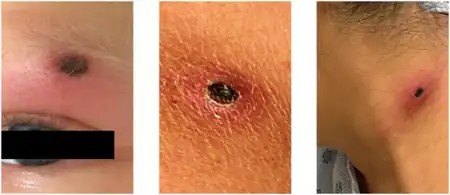Pacific Coast tick fever
| Pacific Coast tick fever | |
|---|---|
 | |
| Eschars identified on the eyebrow, shoulder, and neck of laboratory-confirmed Pacific Coast tick fever individual(s) | |
| Causes | Rickettsia philipii spread by the Pacific coast tick[1] |
| Differential diagnosis | Rickettsia parkeri rickettsiosis, Rocky Mountain spotted fever, rickettsialpox[2] |
| Pacific Coast tick fever | |
|---|---|
| Scientific classification | |
| Domain: | Bacteria |
| Phylum: | Pseudomonadota |
| Class: | Alphaproteobacteria |
| Order: | Rickettsiales |
| Family: | Rickettsiaceae |
| Genus: | Rickettsia |
| Species group: | Spotted fever group |
| Species: | R. philipii |
| Binomial name | |
| Rickettsia philipii Kato et al. 2010[3] | |
Pacific Coast tick fever is an infection caused by Rickettsia philipii.[1]
The disease is spread by the Pacific coast ticks.[1]
Symptoms may include an eschar.[1] It is within a group known as spotted fever rickettsiosis together with Rickettsia parkeri rickettsiosis, Rocky Mountain spotted fever, and rickettsialpox.[2] These infections can be difficult to tell apart.[2]
References
- 1 2 3 4 "Spotted Fever Group Rickettsia (Rocky Mountain Spotted Fever and Pacific Coast Tick Fever)". www.cdph.ca.gov. Archived from the original on 27 September 2022. Retrieved 20 January 2019.
- 1 2 3 "Epidemiology and Statistics Rocky Mountain Spotted Fever (RMSF)". CDC. 26 October 2018. Archived from the original on 9 January 2019. Retrieved 19 January 2019.
- ↑ Kato, C.Y., Robinson, L.K., White, F.H., Slater, K., Karpathy, S.E., Eremeeva, M.E. and Dasch, G.A. "Insertion/deletion (INDEL) typing of isolates of Rickettsia rickettsii." Georgia Research Alliance Collaboration Roundtable. February 26, 2010. Poster Abstracts no. 10. pp. 5-6
This article is issued from Offline. The text is licensed under Creative Commons - Attribution - Sharealike. Additional terms may apply for the media files.